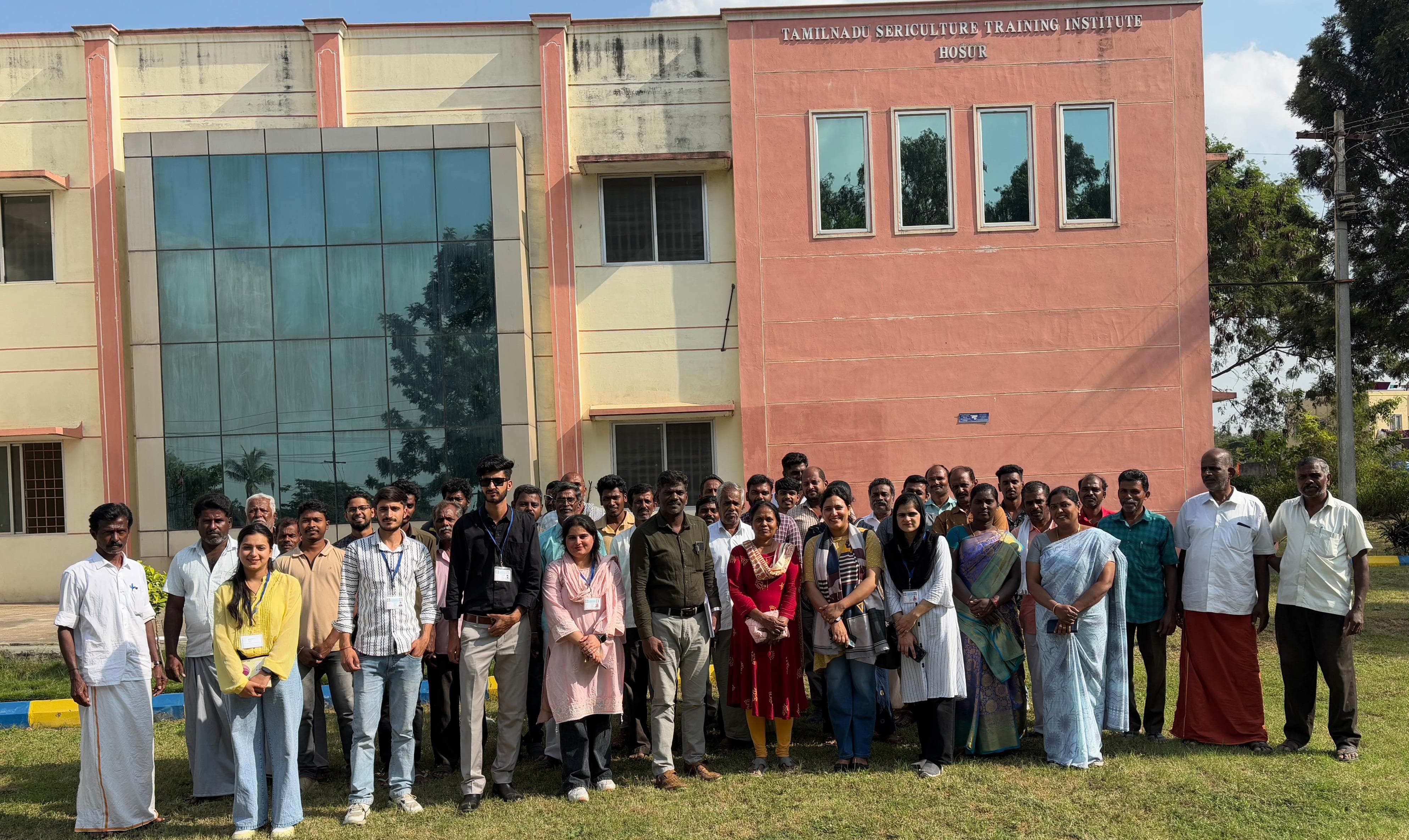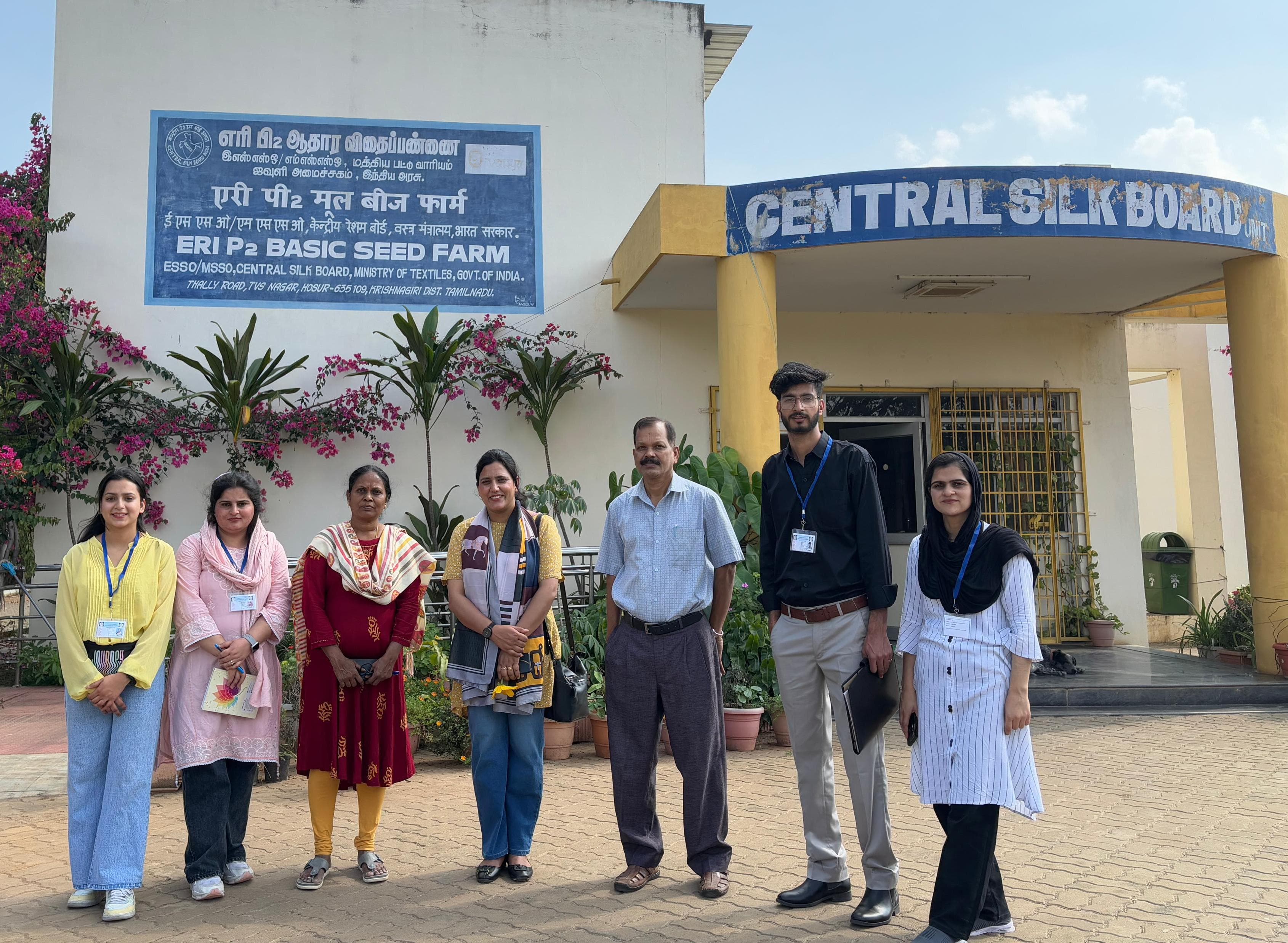About University

Cradled in the lap of mountains at the foothills of auspicious Trikuta, besides the river Tawi at an altitude of 1030 ft. is Jammu. This 'city of temples' has many places...
Students from the Department of Sericulture Poonch Campus, University of Jammu, recently embarked on an educational tour to South India, gaining invaluable insights into advancements in sericulture technology and bridging the gap between theoretical learning and practical applications.
 At the Central Silk Technological Research Institute (CSTRI), Bengaluru, the students interacted with scientists and technical experts. Dr. Nivedita S., Scientist-D, delivered an engaging lecture on innovations in silk reeling, weaving and processing with a focus on sustainability. Demonstrations by Mr. Sanket Kuge and Mr. Babu showcased advanced reeling technologies for mulberry, tasar, muga and eri silk, emphasizing quality and efficiency. The students also explored modern weaving techniques under Mr. Sumit Kumar and learned quality control from Dr. Brojeswari Das, who demonstrated raw silk testing methods. The group then visited the Central Sericultural Germplasm Resources Centre (CSGRC), Hosur, Tamil Nadu, under the guidance of Dr. V. Nishitha Naik, Director, CSGRC. She emphasized the importance of conserving mulberry and silkworm germplasm for the sustainability of sericulture. Dr. Raju Mondal, Scientist-B, detailed advancements in plant cytology and mulberry improvement, while Smt. G. Punithavathy, Scientist-D, gave a comprehensive tour of the Sericulture Museum, showcasing eri silkworm rearing and seed distribution processes.
At the Central Silk Technological Research Institute (CSTRI), Bengaluru, the students interacted with scientists and technical experts. Dr. Nivedita S., Scientist-D, delivered an engaging lecture on innovations in silk reeling, weaving and processing with a focus on sustainability. Demonstrations by Mr. Sanket Kuge and Mr. Babu showcased advanced reeling technologies for mulberry, tasar, muga and eri silk, emphasizing quality and efficiency. The students also explored modern weaving techniques under Mr. Sumit Kumar and learned quality control from Dr. Brojeswari Das, who demonstrated raw silk testing methods. The group then visited the Central Sericultural Germplasm Resources Centre (CSGRC), Hosur, Tamil Nadu, under the guidance of Dr. V. Nishitha Naik, Director, CSGRC. She emphasized the importance of conserving mulberry and silkworm germplasm for the sustainability of sericulture. Dr. Raju Mondal, Scientist-B, detailed advancements in plant cytology and mulberry improvement, while Smt. G. Punithavathy, Scientist-D, gave a comprehensive tour of the Sericulture Museum, showcasing eri silkworm rearing and seed distribution processes.
 The students also explored the SeriBiotech Research Laboratory (SBRL), Bengaluru, where Dr. G. Subrahmanyam, Scientist-D and Dr. Pawan Shukla, Scientist-D, introduced them to cutting-edge research in sericulture biotechnology. Laboratory trials demonstrated advanced silkworm breeding techniques, disease management and molecular biology. Ms. Navidita, Senior Research Fellow, provided a hands-on demonstration of sophisticated laboratory instruments, offering students a practical perspective on modern sericulture research. The visits to CSTRI, CSGRC and SBRL provided an unparalleled opportunity for students to witness firsthand the integration of technology, conservation efforts and research in the sericulture industry. These interactions and demonstrations are expected to inspire students to contribute innovatively to sericulture and explore sustainable solutions.
The students also explored the SeriBiotech Research Laboratory (SBRL), Bengaluru, where Dr. G. Subrahmanyam, Scientist-D and Dr. Pawan Shukla, Scientist-D, introduced them to cutting-edge research in sericulture biotechnology. Laboratory trials demonstrated advanced silkworm breeding techniques, disease management and molecular biology. Ms. Navidita, Senior Research Fellow, provided a hands-on demonstration of sophisticated laboratory instruments, offering students a practical perspective on modern sericulture research. The visits to CSTRI, CSGRC and SBRL provided an unparalleled opportunity for students to witness firsthand the integration of technology, conservation efforts and research in the sericulture industry. These interactions and demonstrations are expected to inspire students to contribute innovatively to sericulture and explore sustainable solutions.
Dr. Rubia Bukhari, who is accompanying the students, expressed her gratitude to Prof. Rakesh Vaid, Director Poonch Campus for supporting this initiative. She highlighted that such exposure plays a pivotal role in shaping students’ academic and professional trajectories. The students described the tour as a transformative experience, enhancing their understanding of the complexities of sericulture and its potential for sustainable development, reaffirming Poonch Campus's commitment to excellence in education.